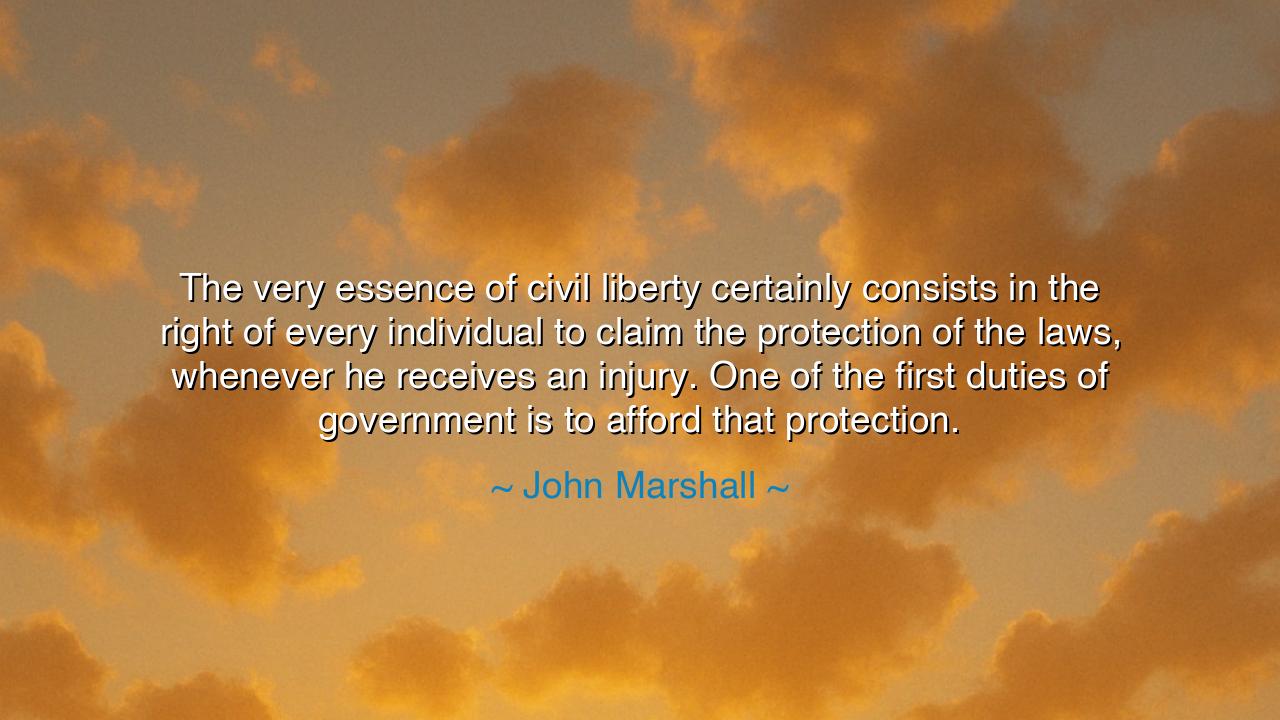
The very essence of civil liberty certainly consists in the right
The very essence of civil liberty certainly consists in the right of every individual to claim the protection of the laws, whenever he receives an injury. One of the first duties of government is to afford that protection.






The great Chief Justice John Marshall, whose wisdom shaped the foundations of American law, once proclaimed: “The very essence of civil liberty certainly consists in the right of every individual to claim the protection of the laws, whenever he receives an injury. One of the first duties of government is to afford that protection.” These words, calm and deliberate in tone, are in truth a thunderclap of justice. They remind us that liberty is not merely the absence of chains, but the presence of protection — that a man is not truly free unless the law defends his dignity when it is violated. Marshall’s insight cuts to the heart of civilization itself: for what separates tyranny from justice, anarchy from order, is the sacred promise that the law stands above all — even kings, even governments, even time itself.
To understand the meaning of this quote, one must first see that liberty without protection is a hollow illusion. The freedom to speak, to labor, to believe, or to live as one chooses means little if the law does not shield these rights from violation. For Marshall, civil liberty was not a fragile dream to be admired from afar — it was a living covenant between citizen and state, a bond that declared: “You are not alone.” When injury, injustice, or oppression strikes, the law must rise in defense of the smallest soul. The greatness of a government, he taught, is not in its power to punish, but in its willingness to protect. It is this principle that makes justice the lifeblood of liberty.
The origin of this wisdom lies in the very dawn of the American republic. John Marshall, who served as Chief Justice from 1801 to 1835, presided over the shaping of a nation still trembling between chaos and order. The Constitution was young, its meanings contested, its strength untested. Marshall, through his judgments, forged it into a living instrument of justice. He understood that liberty without law descends into disorder, and law without liberty becomes tyranny. His words were born from the belief that the rule of law must be the shield of every person, not merely the privilege of the powerful. In his vision, the courts were not cold chambers of procedure — they were sanctuaries where the weak could find redress and where justice could speak without fear.
History offers many examples of this principle made flesh. Consider the case of Marbury v. Madison (1803), the very case in which Marshall spoke these immortal words. It was a moment of profound danger: the young republic stood divided, its branches of power at war. Yet in that crucible, Marshall affirmed the right of the individual — William Marbury — to seek the protection of law against the government itself. In doing so, he established the power of judicial review, declaring that even the highest officers of the state were not above the law. That act of courage forever changed the course of constitutional history, proving that liberty’s survival depends on justice that stands higher than authority.
The spirit of Marshall’s quote reaches beyond his time and into every age. In nations where citizens fear the law rather than trust it, liberty dies in silence. When corruption twists justice to serve the few, or when power turns away from the cries of the wounded, society begins to unravel. Marshall’s teaching reminds us that government exists not to rule, but to serve; not to command, but to protect. The measure of a nation’s greatness lies not in its wealth or might, but in how faithfully its laws guard the helpless, the voiceless, and the oppressed. The first duty of government, as he said, is not ambition — it is compassion made lawful.
And yet, his words are not meant for rulers alone. They call to each of us — for the strength of law rests upon the virtue of those who live beneath it. The citizen who turns away from injustice, who tolerates corruption, or who mocks the rights of others, weakens the very foundation upon which his own freedom stands. Liberty is a shared trust, guarded not only by judges and lawmakers, but by the conscience of every soul who values fairness above convenience. The law is a mirror of the people’s heart; if that heart grows cold, justice will fade, and the protection once promised will vanish like smoke.
The lesson of John Marshall’s words is timeless: freedom is not self-sustaining — it must be guarded through law, nurtured through virtue, and renewed through vigilance. To claim the protection of the law is to affirm one’s worth as a human being; to extend that protection to others is to affirm one’s humanity. Let every citizen demand justice not out of anger, but out of reverence for what binds a people together. Let every government remember that its first and noblest task is not conquest, but care — to defend the innocent, to restrain the cruel, and to ensure that no injury, however small, goes unhealed beneath the eye of justice.
And so, my child, carry this wisdom as a torch through the ages: where the law is just, liberty breathes; where the law protects, peace endures. But when the law forgets compassion, or when the government forgets its duty to defend the weak, darkness returns. Let your life be a testament to the truth that the essence of civil liberty is not found in rebellion or privilege, but in the quiet, enduring promise that when you are wronged, justice will answer — not with vengeance, but with the steadfast hand of protection under law.






AAdministratorAdministrator
Welcome, honored guests. Please leave a comment, we will respond soon